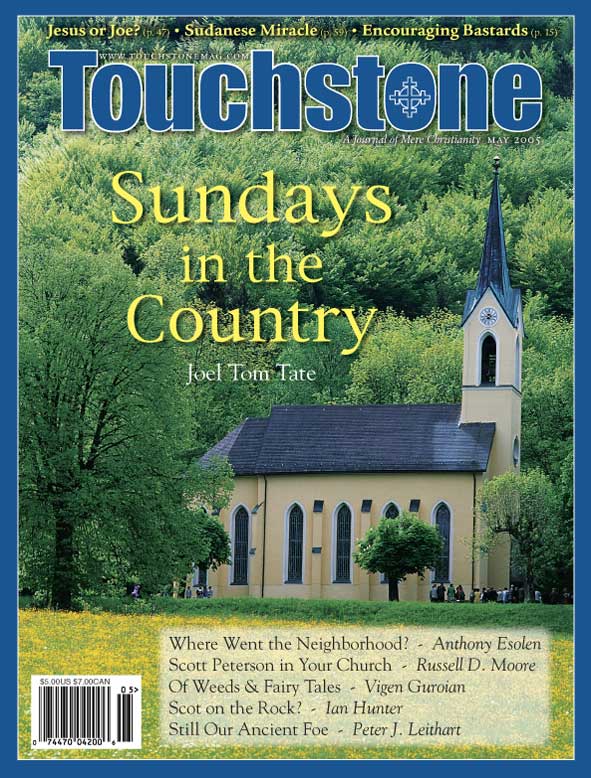Feature
Where Went the Neighborhood?
On the Neighbors We Have Lost But Desperately Need
The scribe had just been praised for answering well, but he could not resist pressing his guest, hoping perhaps for a misstep that he might later use against him. “And who,” he asks, “is my neighbor?” That question ought to make the modern American uneasy, and, if the atomizing trends of our culture continue much longer, it ought to make everybody else in the Western world uneasy, too.
Of course it happens not to make us uneasy, because we have read a hundred times the story that follows, planed it right down into triteness and oblivion. We anticipate what we think is its moral. Everybody is my neighbor.
The street-roaming woman in Delhi whose wrist is so thin I can lay my thumb and forefinger around it, is my neighbor. The journalist in Djakarta thrown into a malarial prison for daring to suggest that some government factotum is not the voice of Allah, is my neighbor. The boy in Port-au-Prince whose innocence has long been warped and initiative stifled by fears of murder or blood cults or both, is my neighbor. All the world’s huddling masses, yearning to breathe free, trodden into the mire by tyrants, robbed of hope by stupid staring idols, living in squalor, their very flesh bearing the pustules of destitution and debauchery, with hardly a rag to cover their shame, are my neighbors.
All they with the good grace to be wretched far out of my sight and smell are my neighbors. Everybody in the world is my neighbor—everybody, that is, except the person next door. For all I know, that unpleasant creature may have two heads, one for his daily ignorance and one for receiving messages from his home planet whirling around Procyon.
Ethereal Neighbors
Indeed, our own next-door neighbor is a middle-aged woman named Noreen. She is divorced and has a couple of grown children. Having said that, I have said all we know about Noreen. On our other side lives a young childless couple. The truck in his driveway shows he works for the cable company. We know no more.
If Jesus’ parable is an extended metaphor for a life of mercy—if we are to treat those suffering souls whom chance has thrown in our way as if they were people among whom we live—then we have taken the wheels off that metaphor’s vehicle. If you do not really have neighbors, how can you understand Jesus’ command to be a neighbor to others? You have to disembody it, etherealize it into a manifesto of general benevolence and almsgiving (perhaps of the political variety, whereby you stoutly sacrifice the alms of other people). Jesus tells the story of the Good Samaritan, and you hear a call to be kind to your friends and to give to the United Way.
But before I come to how I think that parable must be understood, I should vindicate myself and my family just a bit, and in so doing point out a few reasons why neighborhood life in America is past. You see, my wife and I are not by nature sullen or withdrawn or suspicious. We live in a suburb of Providence, Rhode Island, but we have begun to spend summers in a small home in an old fishing village, called West Arichat, on the coast of Cape Breton Island, in Nova Scotia. In that village, after only a few weeks, we have met more people—have been in their homes, have eaten with them—than we have in eight years in our place in the States.
Now, I like Canadians, and no doubt part of the difference is due to their irrepressible friendliness and simple candor. But that begs the question. Why should they be so? Our neighbors on Cape Breton are only beginning to learn who we are, yet they befriend us and help us, as neighbors. Why?
A Loyal Place
First, they are poor. Not destitute: they eat well, they wear warm clothes, and their roofs don’t leak. But their houses are small and snug and their cars old. The practical implications of their healthy and hardworking poverty are many.
Since people can’t afford to hire chic contractors to do it, if they want to add a deck to the back of the house, they have to do it themselves. That is, they call their cousins, friends, and those people who somehow happen to live nearby—their neighbors—and they get the job done in a day or two. This is the rule, not the exception, and not only for porches and decks.
If your house needs a new roof (ours does), every man on your street has at one time or another put a new roof on his own or a neighbor’s house. If the pump to your well needs to be filled and primed and started (ours did), the fellow up the road is good at that and will come over to show how it’s done.
If an enormous half-dead spruce is hanging over your house (one is) and needs to be dispatched, the old man with the perpetual yard sale, who once lived in your house and enlarged the kitchen and dug the well and hung swings in the barn, will bring back his chainsaw from his grandson’s in Halifax and gather a couple of men to help you chop it down. That man is on the yonder side of eighty.
If a modest living helps, so do straitened opportunities.
I suspect that people grow loyal to a place when they are rooted to it, not the reverse. It takes time to see the beauty of mudflats at low tide, of the skittish sandpipers, of treeless bluffs, of carpets of flat juniper that manage to survive the stiff cold wind from the sea. It takes patience to pick the wild strawberries, as tiny as blueberries, but sweeter and far more pungent than the fat watery things in the store.
People in West Arichat are beginning to move out, but for generations all the men fished or set traps for lobsters, or worked on boats, or built houses and laid pipe for people who worked on boats. It was assumed that a man would do something of the sort, and of course in that case he might as well stick around. On our particular island of four villages, a handful of surnames suffices for most of the five thousand people.
Everyone knows you: where you live, who your brothers and sisters are, what your father did for a living, who his wife’s kin were, probably who laid the cement for your sidewalk and whether your uncle really was the drunk people say he was. It is impossible to be lonely here.
Catholic Poverty
It is also impossible here—I make no claims about the rest of Canada—to be far from the shadow of the Church. Call this a third form of poverty. In our village it is taken for granted that you are Roman Catholic.
Most of the people are of French descent (and it is a delight to hear folks of all ages, in the easygoing patois of their fathers and forefathers, veer from French into English and back for no reason at all beyond the fun of it). Most of the rest are Scots Catholics whose ancestors emigrated when the Kirk made life in the glens intolerable. The point is not that they are Catholics, in particular, but that they are anything at all, and that they share their faith in common, no matter how often or how grievously they may sin against it.
As money is tight and jobs are few, so are your choices in churches: We have four Catholic churches nearby, staffed by three arch-traditional young priests along with two retired priests and a deacon. Masses are said in French or English, depending on the schedule, and sometimes, to accommodate visitors, both. There is also an Anglican Church, and, on the ground floor of an old grocery, a new Bible Church. That is that.
Thus, you can be a devout Catholic (and, by the looks of it, many are), or a rotten Catholic, but people know where to have you, and maybe, in the end, the sheer force of their expectations will haul you back in. The Church here is a large part of the community’s life. For example, when the town held its three-day summer festival, Notre Dame de l’Assomption held her Mass outdoors, on the grounds of a provincial museum, on the very stage where harmless karaoke contestants would later show their neighbors what they possessed of talent.
No hypochondria about church and state. What would village life be like, or could there be any true village culture at all, without the common holy day and worship of the Creator?
I wish I could say that West Arichat will always be full of neighbors, but, like Canadians elsewhere, the people are beginning to pick up a few of our American habits, and these will undo them, as they have undone us. I don’t mean to blame the Canadians, but facts are facts.
Dying Neighbors
The bad habits I am talking about are the spawn of a desire for autonomy. People in West Arichat used to have large families (so did people in Providence, once upon a time), but children are surer than anchor flukes to moor you to the mud; so large families are no more.
Again, the village’s relative poverty is, in part, a shield against the evil effects of willful childlessness, as it is also a shield against the evil effects of divorce. Because people know each other, the only child or the semi-orphan will yet grow up within a web of family relationships. He will have a place; he will be known; he will have neighbors.
But this palliating condition cannot last. The uncles and aunts and grandparents from the large old families will die, and it will be here as it is in the States, where children know no cousins and are lucky if they enjoy the blessings of the nuclear family. And at that, the nucleus will be but of hydrogen or helium.
The people are also growing impatient of the small houses. In part, they are compelled to seek more lucrative opportunities: The fishing business has slogged here ever since over-harvesting caused Ottawa to impose a moratorium on cod fishing that still stands. Yet when people send their children to the university, they are inevitably sending them out of the community for good; nor, because of the exigencies of white-collar life, will those children establish new communities where they go.
In those suburbs, as in the States, people do not work near their homes; small businesses have fallen prey to snobbery and are zoned out of residential neighborhoods; families are small; the schools are vast and hulking and far away; churches come in a veritable menu, nor are they on the street where the young professional lives; and of course, nobody on that street can assert that he will still be living there in ten years, or even five. It is a life of divorce, even if a couple should remain together.
Ghost Towns
There is yet another cause of neighborlessness, one so obvious it surprises me that no theologian I know of has remarked upon it, not even the pope, keenly attuned to the bodily nature of man though he be. Home-schoolers know what it is. Simply this: You cannot have a neighborhood when no one is home. Neighborhood life does require the fostering arts of wives and mothers.
It was bad enough that the industrial revolution took men (and very often women) from their homes and set them to toil in the brick monster a mile away; but at least the children knew where the monster was and could themselves go there, if they had not already themselves been impressed into that maw. It was worse when the breadwinning father had to work in some office out of town, only appearing at the end of a frustrating day or on weekends.
But now the culture of personal achievement and illusory autonomy—which is to say, the culture of total work, that has turned Sunday into at best a brief restorative for the infinitely more important Monday, if Sunday is not already Monday along with all the other days of the week—this paltry culture, I say, has atoned for removing the father from the home by removing the mother, too. The results are ghost towns, rich in things (and not even so dreadfully rich in those, either, once the unnecessary bills and the taxes are paid) and poor in soul.
No children crisscross the backyards of their playmates, because they have no playmates, nor do they even know the names of the people who own the yards. Nor are there the shouts of children to cheer the heart; those who have been graciously allowed to live, live under a sort of parole, whereby they are trucked before breakfast far away to a gaily postered miserable asylum, and then are trucked back to the groomed lawn and flophouse just before sundown.
If some delinquent child should venture onto the street before his male or female parent has returned from the commissariat, and bust up his knees by falling from his bicycle, he can cry all he wants. Nobody will hear him. The society of women is no more. There are no mothers who are not your own mother, and your own mother is not around, and, if she is around (let the truth be told), often enough she is no great shakes either. You are an appendage, or appendix, to her career, and you know it.
No old ladies sit on the stoop to gossip and patrol the street. No underwear of all shapes and sizes flaps on anybody’s line; people prefer to cook their clothing (though not their meals) in the privacy of their houses. No need for invasion from another planet: we are our own aliens.
No one home; no neighborhood; no community. Want to be depressed? Go to a Memorial Day parade and watch the nameless people of a repeatedly chosen and unchosen American town pretend to have some memory to honor and some heritage to celebrate.
Your Real Neighbor
The scribe asks Jesus, “Who is my neighbor?” He has a head start on us: He at least knows the names of the people who live around him. He expects Jesus to give a learnedly abstract answer; something as airy as Liberty, Equality, and Fraternity, at least where Jews are concerned. All the sons of Abraham are your neighbors. So he thinks he will hear.
But Jesus’ reply is a great deal more inclusive, and, to our astonishment if we would but listen, ineluctably particular and embarrassingly bodily. We all know that when Jesus tabbed the Samaritan as the man who stopped on the road, he was exploding the scribe’s pretension to special virtue. The Samaritans were despised as heretics, but here the Samaritan is the hero. All the world, even a Samaritan, is your neighbor.
That, I am afraid, shifts the stress of the parable. Let us try to look at it afresh:
And Jesus answering said, “A certain man went down from Jerusalem to Jericho, and fell among thieves, which stripped him of his raiment, and wounded him, and departed, leaving him half dead. And by chance there came down a certain priest that way: and when he saw him, he passed by on the other side. And likewise a Levite, when he was at the place, came and looked on him, and passed by on the other side.
But a certain Samaritan, as he journeyed, came where he was: and when he saw him, he had compassion on him, and went to him, and bound up his wounds, pouring in oil and wine, and set him on his own beast, and brought him to an inn, and took care of him. And on the morrow when he departed, he took out two pence, and gave them to the host, and said unto him, Take care of him; and whatsoever thou spendest more, when I come again, I will repay thee.
Which now of these three, thinkest thou, was neighbor unto him that fell among thieves?” (Luke 10:30–36)
“Who was a neighbor to the man?” asks Jesus, reversing the scribe’s question. We like to put ourselves in the sandals of the passersby, trusting that we who do not know the names of the people on our own street would take sufficient notice of the man in the ditch to save his life. It does not occur to us that we are the man in the ditch. We are the sinners. We are those who long for immortality but who are destined to die.
We are the wretch who has been robbed and beaten and left for dead. The scribe expects an appeal to his almsgiving; instead, he is instructed in his own weakness, moral and bodily. Do not play the patron, says Jesus. You are the one who needs the neighbor.
And note what the passersby do. Jesus does not simply say that the priest and Levite, the stockbroker and college professor and attorney and other big shots, continue on their journey. These are human beings still, not monsters. They must walk past “on the other side”! They cannot get too close—I mean close enough perhaps to hear his groans—lest whatever important work they are about be deferred. Judge them not so harshly. A lot of children of divorce, for instance, are lying in that same ditch. We human beings have a marvelous capacity for walking on the other side.
The Present Neighbor
The Samaritan, by contrast, is physically present to the beaten man. Jesus does not simply say he assisted him. The Samaritan goes down to get him. He removes the man’s torn clothing to pour oil and wine into his wounds. Think of what this means: He probes the victim’s wounds with his hands. They are not cyberhands; his flesh is real flesh, and with that flesh he binds up the wounds, stirs the man back to consciousness, hoists him atop his mule, probably propping him there with his arm while they go on, and takes him to the inn.
There he cares for him—and that can only mean that he tends to his humble bodily needs. He gives him to drink. He feeds him a little. He cleans him up and puts fresh linen on him.
This is how the Samaritan is a neighbor to him; but were it not for neighbors, there would have been no Samaritan. Jesus presupposes that there are such things as neighbors. If the crabby old man down the road has suffered a spell in his garden, you get down off your ladder and run over to him, calling for help. You may grouch about it, but you do it.
Notice in the story that the innkeeper, too, becomes a neighbor: The Samaritan entrusts his charge to him and expects the host to trust him to return in a few days to make up any further expense he might incur. What happens to these three—Samaritan, innkeeper, and Everyman—is predicated on a life of people rubbing elbows every day, raising each other’s roofs and barns and children; a life of neighbors, a life that in many places is not even a memory.
It is a life we cannot be fully and joyfully human without. Colleagues at work will come and go; we seldom—literally, bodily—touch them. They will not be found together leaning over a backgammon board on a cool summer evening, smoking and telling stories. They will not be calling to each other across the street over the noise of children. They will not smell each other’s suppers in the air.
For all their pale collegiality, they—we—do not let each other know about the robbers and the ditch. Nobody stops by. The street is silent. •
Anthony Esolen is Distinguished Professor of Humanities at Thales College and the author of over 30 books, including Real Music: A Guide to the Timeless Hymns of the Church (Tan, with a CD), Out of the Ashes: Rebuilding American Culture (Regnery), and The Hundredfold: Songs for the Lord (Ignatius). He has also translated Dante’s Divine Comedy (Random House) and, with his wife Debra, publishes the web magazine Word and Song (anthonyesolen.substack.com). He is a senior editor of Touchstone.
subscription options
Order
Print/Online Subscription

Get six issues (one year) of Touchstone PLUS full online access including pdf downloads for only $39.95. That's only $3.34 per month!
Order
Online Only
Subscription

Get a one-year full-access subscription to the Touchstone online archives for only $19.95. That's only $1.66 per month!
bulk subscriptions
Order Touchstone subscriptions in bulk and save $10 per sub! Each subscription includes 6 issues of Touchstone plus full online access to touchstonemag.com—including archives, videos, and pdf downloads of recent issues for only $29.95 each! Great for churches or study groups.
Transactions will be processed on a secure server.
more from the online archives
calling all readers
Please Donate
"There are magazines worth reading but few worth saving . . . Touchstone is just such a magazine."
—Alice von Hildebrand
"Here we do not concede one square millimeter of territory to falsehood, folly, contemporary sentimentality, or fashion. We speak the truth, and let God be our judge. . . . Touchstone is the one committedly Christian conservative journal."
—Anthony Esolen, Touchstone senior editor









